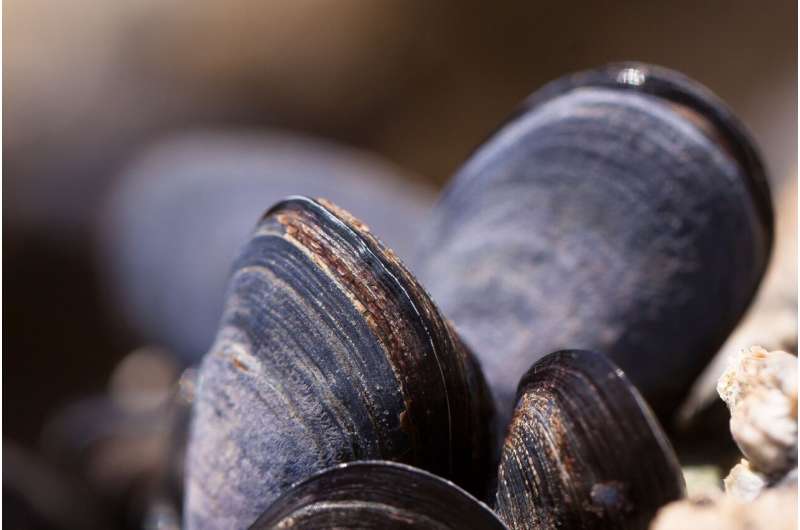This article has been reviewed according to Science X's editorial process and policies. Editors have highlighted the following attributes while ensuring the content's credibility:
fact-checked
proofread
Team finds that the bivalve mollusk Anadara kagoshimensis can endure high water salinity

Hypersalinity is a condition in which water contains a high concentration of salt. In soft reservoirs, the concentration of salt is not high, and in hypersaline water the percentage of salt is 40% and higher. Hypersalinity is characteristic of salt lakes and bays where fresh water evaporates faster than new water manages to replenish.
Surplus content of salts can lead to distortions of salt balance (osmotic stress) in water inhabitants, including bivalve mussels. It can influence cellular metabolism, concentration of intracellular fluid and cell size. High salinity can also lead to dehydration of cells, which negatively influences processes of growth, development and reproduction of mussels.
In the process of evolution, some types of bivalve mussels, including anadara, developed specialized mechanisms to adapt to high water salinity. Thanks to them, mussels can regulate their metabolism and change behavior in order to survive in unfavorable conditions.
The bivalve Anadara kagoshimensis is an invader and has lived in the Black Sea since the 1950s. Like all bivalve mollusks, it can't sustain the constant concentration of substances inside cells and inside itself when the salinity of its environment changes. However, these mollusks are able to adapt to changes of salinity due to intracellular reconstructions of regulation systems that process salts and water. These adaptations on the cellular level are followed by unique significant reconstructions of physiology of cells of the organism.
Scientists from Laboratory of ecological immunology of aquatic organisms at the A.O. Kovalevsky Institute of Biology of the Southern Seas of RAS (Moscow) and Department physiology and biochemistry of animals of the A.O. Kovalevsky Institute of Biology of the Southern Seas of RAS (Moscow) have studied the influence of high water salinity on cell composition of the hemolymph—liquid that fulfills transport and protective functions in organisms of bivalve mussels.
The paper is published in the journal Fish & Shellfish Immunology.
In the course of the experiment, biologists placed mussels in water whose salt concentration was gradually increased from 18% to 35% and 45%, and maintained them in these conditions during two days. Researchers learned that maintenance in the environment with 35% salinity changed the structure of red blood cells and reduced their diameter. In an environment with 45% salinity, the team observed an increase in the size of cells of the hemolymph. However, they noted that prolonged exposure to hypersaline water didn't lead to the death of blood cells of the ark shell.
The results of the research showed that A. kagoshimensis had high tolerance to short-time duration of high-salinity water. The scientists suggested that the base of the high-adaptive potential of anadara to a hypersaline environment included intracellular reconstructions that took place, especially in hemocytes. At the same time, direct mechanisms and methods of cell stability under osmotic stress require further research in tolerant bivalve mollusks.
More information: E.S. Kladchenko et al, Effect of hypersalinic stress on hemocyte morphology and hemolymph cellular composition of the ark clam (Anadara kagoshimensis), Fish & Shellfish Immunology (2023). DOI: 10.1016/j.fsi.2023.108867
Provided by Scientific Project Lomonosov





















